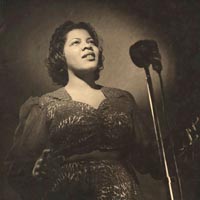
The repercussions of World War II devastated the music industry. After America's entry into the war on December 8, 1941, the federal government rationed gasoline and rubber and other precious resources. The scarcity of gasoline and tires made traveling difficult for big bands, particularly African American bands that relied on one night stands. A ban on recordings by union members called by ![]() James Petrillo, President of the American Federation of Musicians (AFM), effective July 31, 1942, put additional hardship on musicians who were struggling to make a living. Furthermore, the military draft decimated the ranks of bands, hastening the end of the big-band era. The last two great African American big bands to come out of Kansas City, the
James Petrillo, President of the American Federation of Musicians (AFM), effective July 31, 1942, put additional hardship on musicians who were struggling to make a living. Furthermore, the military draft decimated the ranks of bands, hastening the end of the big-band era. The last two great African American big bands to come out of Kansas City, the ![]() Jay McShann and
Jay McShann and ![]() Harlan Leonard bands, disbanded during World War II.
Harlan Leonard bands, disbanded during World War II.
While the ![]() big bands declined nationally, a number of small groups thrived in Kansas City.
big bands declined nationally, a number of small groups thrived in Kansas City. ![]() Myra Taylor, Walter Page and other musicians cast off from the decline of the big bands returned to Kansas City.
Myra Taylor, Walter Page and other musicians cast off from the decline of the big bands returned to Kansas City. ![]() Dwight "Gatemouth" Moore and other musicians traveling on the "chitlin' circuit" joined with returning members to revitalize Local 627.
Dwight "Gatemouth" Moore and other musicians traveling on the "chitlin' circuit" joined with returning members to revitalize Local 627. ![]() Julia Lee, the
Julia Lee, the ![]() Jimmy Keith band, the
Jimmy Keith band, the ![]() Four Tons of Rhythm, the
Four Tons of Rhythm, the ![]() Jesse Price band,
Jesse Price band, ![]() Tommy Douglas's band,
Tommy Douglas's band, ![]() Oliver Todd's Hottentots and a number of other small ensembles found steady work in the clubs at 18th and Vine, downtown and those "out in the county" that thrived in the post-war period.
Oliver Todd's Hottentots and a number of other small ensembles found steady work in the clubs at 18th and Vine, downtown and those "out in the county" that thrived in the post-war period.
In 1949, Local 627 underwent a changing of the guard when members expelled long-time President William Shaw for alleged misappropriation of funds. Band leader Elmer Payne, a contemporary of Bennie Moten and George E. Lee, replaced Shaw as president. Cleaning house, members elected a ![]() new board of directors and officers. The new Secretary-Treasurer, Richard Smith, revamped the accounting system and instilled discipline in the ranks. Smith became the defacto president of the union, attending
new board of directors and officers. The new Secretary-Treasurer, Richard Smith, revamped the accounting system and instilled discipline in the ranks. Smith became the defacto president of the union, attending ![]() national conferences, running membership meetings and publishing the in-house newsletter "Rhythm Notes."
national conferences, running membership meetings and publishing the in-house newsletter "Rhythm Notes."


